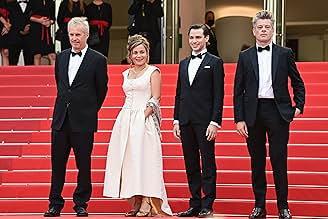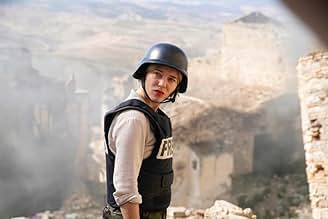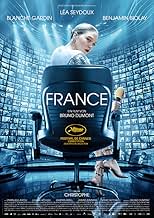A celebrity journalist, juggling her busy career and personal life, has her life over-turned by a freak car accident.A celebrity journalist, juggling her busy career and personal life, has her life over-turned by a freak car accident.A celebrity journalist, juggling her busy career and personal life, has her life over-turned by a freak car accident.
- Awards
- 6 nominations
Alfred de Montesquiou
- Alex
- (as Alfred Demontesquiou)
Storyline
Did you know
- TriviaThe crew was given permission to shoot in the Élysée palace, in the entrance court and one of the salons. Even though Emmanuel Macron, the President of the French Republic at the time, appears in the opening sequence, it's only through the use of archive footage and clever editing.
- Quotes
Voisin tartine: You won't run out of money, we're so rich. To die well, one must die poor. Once you're dead, your kindness will remain.
- ConnectionsFeatured in Conversations avec... (2018)
Featured review
Léa Seydoux gives an admirable performance, demonstrating the range we know she's capable of and has shown elsewhere. No matter what a scene requires of her, she carries it with great ease, and I don't think there's much arguing that her acting here represents the chief value of 'France.' Beyond this, filmmaker Bruno Dumont illustrates keen direction in orchestrating shots and scenes, and I also appreciate David Chambille's cinematography. I also like Christophe's original music, compositions that are fetching in and of themselves, and which are shrewd and witty in how they're employed here. All this is to say nothing of outstanding filming locations, superb production design, lovely costume design, hair, and makeup, and a fine supporting cast. In the proverbial nuts and bolts of the movie, this is really very well done.
It's Dumont's screenplay that I'm struggling with. There's a bounty of strong ideas all throughout the picture, a variety of notions that could have easily been more discretely focused upon to grand success. At various points we're treated to the meaningless word salad of talking heads on television; the absurdity of celebrity, and the pressures of fame; the ego-fluffing and idol worship that might consume personal assistants; the extremely wry, dry inanity of the calculated construction of news reports and programs; the dehumanization of public figures, in that they are not expected or possibly not allowed to show earnest human emotion; the short attention span and fickle favor of public consciousness; the abject horrors of capitalism, and the profoundly upside-down savior complex that the rich and powerful may have; the human frailties and personal problems that even the most publicly visible or celebrated people might bear; and more. Personally I'm inclined to think the latter thread is the best one 'France' can claim, but they're all worthy in their own right. The problem is that the title tries to do it all. In varying measures, and at different times, Dumont touches upon all these notions, and attempts to mix them all together. In theory I suppose the screenplay could have found success, but in practice, here, I think the execution is wildly uneven and imbalanced: I don't think any of the suggested facets receive all due treatment, the storytelling subsequently comes off as scattered, and the swirl of comedy and drama that is intended instead feels like difficulty in finding the right tone, or in figuring out exactly what 'France' should have or needed to be.
As if to emphasize the point, when a significant story beat arrives at around the seventy-five minute mark with character Charles, it truly seems like Dumont couldn't make up his mind as to whether it should have been romantic, underhandedly funny, or heavily dramatic. He tries to make it be all three of these things, but instead it feels like nothing at all. The same goes for shots that isolate the protagonist and zoom in on her, which could be used for dramatic effect or to cheeky, satirical ends; here, they just feel empty. Even more serious story beats to follow outright flounder with the weak treatment they're given. For all the skill Seydoux possesses, and exhibits here, the mishmash of a framework she has to work with means that some of the acting extracted from her in this instance rings hollow in a manner beyond the scope of what the feature cannot achieve and project with any more than partial success. Moreover, as if the many ideas in the writing weren't already treated unevenly, they're presented in a fashion that increasingly feels altogether haphazard, or possibly unfinished before filming commenced. Given that some of the ideas here broach very serious subject matter of one type or another, and that some other moments are plainly frivolous - well, I'll be honest, this happens to be the first of Dumont's works that I've seen. Were I to judge him based purely on this, I can't say I'd be inclined to explore anything else he's made.
Once more: in many regards this is well made, and in the very least, Seydoux is definitely the shining star of 'France.' Among the qualities it can boast, I simply don't think Dumont's screenplay is one of them. There was boundless potential, and so many good thoughts, but far, far too little of it was arranged in a shape that lets any of it take hold, or count for much of anything. I think what really needed to happen here was for Dumont to have at least one other pair of eyes corroborate on the writing, at least for the sake of tightening the whole, trimming excess, and finding a more cohesive, centered path forward for the story. I don't dislike this picture; I don't think it's any more than half the picture it could have been. When all is said and done it's hard for me to particularly recommend this, even for those who are huge fans of Seydoux or someone else involved. I won't recommend against it, but there are many, many other titles one could be watching instead, and many that approach all the included concepts more thoughtfully. There are worse ways to spend 130 minutes than watching 'France,' yet the problem is that with the finished product being such as it is, there are also certainly far better ways to spend one's time, too, and ultimately I wonder if I'm not being too generous in my assessment.
It's Dumont's screenplay that I'm struggling with. There's a bounty of strong ideas all throughout the picture, a variety of notions that could have easily been more discretely focused upon to grand success. At various points we're treated to the meaningless word salad of talking heads on television; the absurdity of celebrity, and the pressures of fame; the ego-fluffing and idol worship that might consume personal assistants; the extremely wry, dry inanity of the calculated construction of news reports and programs; the dehumanization of public figures, in that they are not expected or possibly not allowed to show earnest human emotion; the short attention span and fickle favor of public consciousness; the abject horrors of capitalism, and the profoundly upside-down savior complex that the rich and powerful may have; the human frailties and personal problems that even the most publicly visible or celebrated people might bear; and more. Personally I'm inclined to think the latter thread is the best one 'France' can claim, but they're all worthy in their own right. The problem is that the title tries to do it all. In varying measures, and at different times, Dumont touches upon all these notions, and attempts to mix them all together. In theory I suppose the screenplay could have found success, but in practice, here, I think the execution is wildly uneven and imbalanced: I don't think any of the suggested facets receive all due treatment, the storytelling subsequently comes off as scattered, and the swirl of comedy and drama that is intended instead feels like difficulty in finding the right tone, or in figuring out exactly what 'France' should have or needed to be.
As if to emphasize the point, when a significant story beat arrives at around the seventy-five minute mark with character Charles, it truly seems like Dumont couldn't make up his mind as to whether it should have been romantic, underhandedly funny, or heavily dramatic. He tries to make it be all three of these things, but instead it feels like nothing at all. The same goes for shots that isolate the protagonist and zoom in on her, which could be used for dramatic effect or to cheeky, satirical ends; here, they just feel empty. Even more serious story beats to follow outright flounder with the weak treatment they're given. For all the skill Seydoux possesses, and exhibits here, the mishmash of a framework she has to work with means that some of the acting extracted from her in this instance rings hollow in a manner beyond the scope of what the feature cannot achieve and project with any more than partial success. Moreover, as if the many ideas in the writing weren't already treated unevenly, they're presented in a fashion that increasingly feels altogether haphazard, or possibly unfinished before filming commenced. Given that some of the ideas here broach very serious subject matter of one type or another, and that some other moments are plainly frivolous - well, I'll be honest, this happens to be the first of Dumont's works that I've seen. Were I to judge him based purely on this, I can't say I'd be inclined to explore anything else he's made.
Once more: in many regards this is well made, and in the very least, Seydoux is definitely the shining star of 'France.' Among the qualities it can boast, I simply don't think Dumont's screenplay is one of them. There was boundless potential, and so many good thoughts, but far, far too little of it was arranged in a shape that lets any of it take hold, or count for much of anything. I think what really needed to happen here was for Dumont to have at least one other pair of eyes corroborate on the writing, at least for the sake of tightening the whole, trimming excess, and finding a more cohesive, centered path forward for the story. I don't dislike this picture; I don't think it's any more than half the picture it could have been. When all is said and done it's hard for me to particularly recommend this, even for those who are huge fans of Seydoux or someone else involved. I won't recommend against it, but there are many, many other titles one could be watching instead, and many that approach all the included concepts more thoughtfully. There are worse ways to spend 130 minutes than watching 'France,' yet the problem is that with the finished product being such as it is, there are also certainly far better ways to spend one's time, too, and ultimately I wonder if I'm not being too generous in my assessment.
- I_Ailurophile
- Jun 30, 2023
- Permalink
- How long is France?Powered by Alexa
Details
- Release date
- Countries of origin
- Official sites
- Languages
- Also known as
- On a Half Clear Morning
- Filming locations
- Schloss Elmau, Krün, Bavaria, Germany(wellness resort in the mountains)
- Production companies
- See more company credits at IMDbPro
Box office
- Budget
- €5,668,000 (estimated)
- Gross US & Canada
- $49,347
- Opening weekend US & Canada
- $5,811
- Dec 12, 2021
- Gross worldwide
- $1,348,498
- Runtime2 hours 13 minutes
- Color
- Aspect ratio
- 1.85 : 1
Contribute to this page
Suggest an edit or add missing content


![Watch Bande-annonce [OV]](https://m.media-amazon.com/images/M/MV5BYzExYzA2ZjktOWI1MS00ZWUwLWE5ZTctYzU4ZGE3NTA4M2VjXkEyXkFqcGdeQXRyYW5zY29kZS13b3JrZmxvdw@@._V1_QL75_UX500_CR0)
























